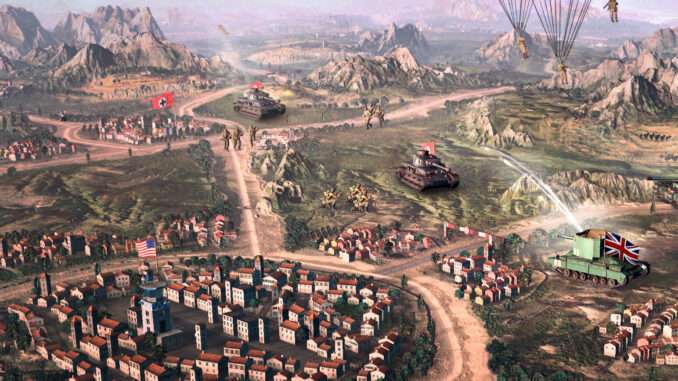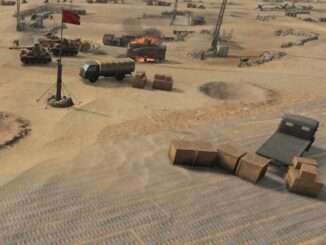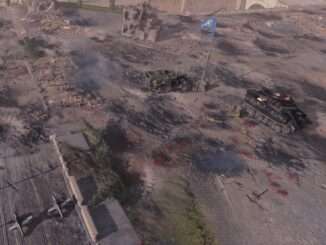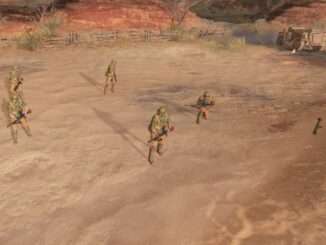
Newbies Guide to Strategy
Unit Preservation
The single most important skill to master in Company of Heroes is to keep your units alive. Lost units cannot really be replaced, because your most important resource – manpower – comes in at a near constant flow. A lost unit means that, for most of the game, you will just be down a unit (unit upkeep aside).
Furthermore, keeping units alive allows them to accumulate veterancy. Veteran units are vastly more powerful than fresh units. Keeping your units alive means that not only will you accumulate a unit advantage over your opponent, but each unit you do have will be stronger.
By the same token, take any opportunities you get to finish off enemy units; any fully wiped squad or destroyed enemy vehicle is a major victory. While territory control is very important, in the long run, unit preservation is even more important. If keeping one of your units alive means ceding control of a point, it is almost always worth ceding the point.
Always be mindful of your unit’s retreat path – for infantry this is the path they will take on retreat; for vehicles this is just whatever path you will use to get them out of any trouble they get into. The amount of danger you should be willing to put your unit into should be heavily influenced by how clear their retreat path is.
Imagine you have an infantry squad engaging at long range with its back towards your HQ. This unit is relatively safe; upon deciding to retreat, this unit will only be in enemy weapons range for a couple seconds before being safe. Now imagine you have an infantry squad flanking the enemy; between your troops and your HQ are enemies. Should you decide to retreat, your units will actively run towards the enemy, allowing your opponent ample time to gun them down at close range. However, if your opponents are forced to retreat, they will be the ones running directly into your units.
This dynamic is what has the potential to make flanking attacks so devastating. Flank attacks make it easy to wipe enemy squads and snowball to victory. However, by the same token, it places your units in a vulnerable spot; a flank attack that goes badly can easily lose you units and allow your opponent to snowball to victory.
Choose When To Fight
One of the most common mistakes new players make is always fighting. If one of their units finds itself near an enemy unit, then they take that fight and do their best to win it. This is a mistake. Not all fights can be won; some fights are destined to go badly and engaging in them will only waste your manpower. Worse, when your unit inevitably retreats, it will be that much longer before all of your units are reinforced, healed up and ready for a real fight you can win.
Often, combat will start when you are not ready for a full-on engagement – vehicles are repairing and squads are reinforcing or just off on another side of the map. In this situation, you should only fight if you have strong reason to believe that your opponent is also missing much of their force. It is rare you have good reason to believe this, so in general, if your enemy pushes and you aren’t ready to fight, just cede the ground and come back a minute later in strength.
Choosing Where To Fight
Map control is central to Company of Heroes; you are never just fighting, you are (or should be) fighting over some important territory. Obviously, high-value points (+16 fuel/munitions) are considerably more valuable than low-value points (+5 fuel/munitions), but don’t ignore the lows; they add up and can be capped quickly.
Strategic Points
General points without any income associated aside from 8 manpower. The primary purpose behind capturing these, other than vision, is to connect other territory. Often, capturing a strategic point will allow you to cut off enemy territory from their home sector, depriving them of resources from the cut off territory. In smaller games like 1v1s or 2v2s, capturing such “cutoff” points is extremely potent, though it becomes much less feasible in larger games.
Fuel
Early game, fuel is usually the most important resource. Before the late game, fuel determines your ability to tech up and, by extension, whether you are going to be steamrolling your opponent with superior units or vice versa. Keep a careful eye on how much fuel you have and how much fuel your opponent has; it can give you strong clues for when you can expect the enemy to start rolling out tanks.
Munitions
The importance of munitions is heavily dependent on army and battlegroup. Munitions are never unimportant – after all, you can always invest them wisely into mines – but strategies relying heavily on unit upgrades, munition-costly unit abilities, or or battlegroup abilities will be much thirstier for munitions.
Victory Points
Every 3 seconds, your or your opponent’s victory points will be reduced by the difference in your owned VPs every 3 seconds. This means that short-term priority of securing VPs depends heavily on the game state. If your opponent has all 3 VPs, then you will lose one VP per second, losing the game from full in only 500 seconds (or 8 minutes and 20 seconds). Thus, if your opponent owns all 3 VPs, you must focus on capturing one.
If your opponent only owns two VPs and you own one, then you have considerably more breathing room. You lose one VP every 3 seconds; from 500 VPs, you will lose the game in 1500 seconds (or 25 minutes). You’re still on track to lose, but in this situation, you can probably still justify pushing for a fuel or munitions point instead and focus more on the long term.
Other cases are situational. Focusing on VPs allows you to pressure your opponent and bring the game closer to a fast conclusion; focusing on resource points allows you to get a more lasting advantage and snowball your way to victory.
Playing From Behind
In Choosing When To Fight, I discussed how some battles are not worth fighting because you know you’ll lose. This theme applies much more broadly than simply when your units are reinforced and ready to fight, though this application of it is a lot more nuanced. The art of playing from behind is understanding when fights will not be in your favor, and being able to avoid letting your opponent snowball until your chances improve.
Any given game of Company of Heroes will have constant shifts in the balance of power. Some of these shifts come from faction mechanics and teching decisions. When the first tank comes out, or when a powerful global upgrade gets researched, that player will have a big advantage. Different factions – by design – get their power spikes at different points in the match. Each power spike is an opportunity to snowball the game in your favor.
These power spikes can also happen more organically. When you lose an important unit, you are on the back foot and new fights are not likely to favor you. Even if you don’t lose a unit, sometimes your unit composition is simply not effective at beating what your opponent has on the field and you seem to be losing every engagement.
If you are on the receiving end of such a power imbalance, that means that your objective must change. If any contentious fight is likely to result in you losing units, then you must not have contentious fights. Your job at this point is to stall or delay. This does not mean you cede the field completely – you cannot do that, because losing all your fuel and munitions income will make your loss a certainty. However, it does mean that you should take many fewer risks with the goal of holding your opponent at bay until your situation changes.
This means using fewer daring tactics; aggressive flanks may be just too risky in this environment, so you opt to center your troops around heavy machine guns and AT guns instead. When your opponent pushes on a side of the map you own, perhaps you push on a different side of the map instead of trying to fight them for it.
One of two things will happen, eventually, to even out the power imbalance and allow you to regain the initiative. One possibility is that, through teching or normal unit production, the balance of power evens out. Maybe you replaced some critical units that you lost, or even achieved a tech-based power spike of your own. This will happen eventually as long as you manage not to let your opponent capitalize on their advantage and get further ahead.
The second possibility is that your opponent gives you an opening. Just as you will be fighting to minimize losses, your opponent will be trying to seize their advantage and close the game out by taking even more territory and killing even more units. This can lead to them overextending or putting their units in aggressive, but risky, positions. They may even get cocky after having won many engagements in succession.
Keep an eye out for this and capitalize on it when you can. When this happens, you have the opportunity to not just even out the game, but completely reverse the balance of power. Everyone makes mistakes, and coming back from a losing position is largely about capitalizing on the ones your opponent makes. The best players are extremely good at mitigating losses and preventing their opponents from snowballing; for this reason, games between skilled players are rarely won or lost early.





Be the first to comment